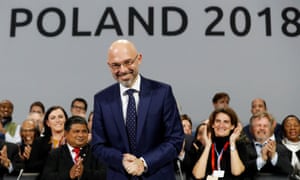The agreement struck in Poland is not strong enough, but the UN process is all we have
The first thing to say about the compromise struck at climate talks in Poland at the weekend is that it came as a relief. Ever since President Trump’s announcement in 2017 that the US would withdraw from the Paris agreement, the question has been whether the UN process could continue to work. Much like the communique that came out of the recent G20,
the agreement on a set of rules to implement promises made in Paris
shows that while multilateralism has been damaged, it is not dead.
Flawed and inadequate though it is, the process that has developed since
the UN Framework Convention on Climate Change was signed in Rio in 1992
is still the best hope we have of staving off the most terrifying
impacts of global warming.
The sticking point of carbon credits, with new demands from Brazil regarding the treatment of forests, was pushed back to next year. But the agreement on how governments will measure and report on emissions cuts is important. The dynamic that previously pitted developing against developed countries has significantly shifted.
Minds will now turn to the next deadline: 2020, when
countries must demonstrate that they have met old targets and set new,
much tougher ones. This round of talks, which the UK aims to host, is
even more crucial following recent warnings
from the Intergovernmental Panel on Climate Change (IPCC) that current
goals are nowhere near ambitious enough. While these set the planet on a
course towards a 3C rise in temperatures, scientists believe even 1.5C
would bring serious consequences. We have around 12 years in which to
bring an unstable situation under control.The sticking point of carbon credits, with new demands from Brazil regarding the treatment of forests, was pushed back to next year. But the agreement on how governments will measure and report on emissions cuts is important. The dynamic that previously pitted developing against developed countries has significantly shifted.
Drastic changes to the global economy are the only option, underpinned by a rapid shift to low and zero-carbon energy, along with adaptation and mitigation measures including new mechanisms to manage migration. The US’s refusal, in Poland, to embrace the IPCC’s findings, along with Russia, Saudi Arabia and Kuwait, was wrong-headed and a hint of troubles ahead. Next year UN secretary general António Guterres will attempt to break the logjam when he hosts a climate summit with heads of state.
Once, the UK claimed a global leadership role on the environment, which was at least partly justified by the 2008 Climate Change Act. Political paralysis connected to Brexit is not the only reason why it now sits on the margins, while increasing cooperation between the EU and China is one of the more hopeful recent signs. The UK’s bid to host the 2020 summit should focus minds, not least on the contradictions of an energy policy that combines phasing out coal with the promotion of fracking. While the UN framework is essential, it cannot do the heavy lifting of cutting emissions, which will be done by nation states or not at all.
This month’s pledge by Danish shipping giant Maersk to be carbon neutral by 2050 was important. Businesses too have a responsibility to the societies in which they operate. But governments cannot wait for the private sector, let alone the energy companies on whose riches so much of the global economy rests. They, and the politicians who champion them, are the vested interests against whom the battle for the future must be fought. Some long-term investors are starting to recognise the risks. So are more and more people, as extreme weather linked to warmer temperatures becomes more frequent. Greta Thunberg, the 15-year-old Swedish activist who addressed the UN in Poland, was right to say “the only sensible thing to do is pull the emergency brake”.

No comments:
Post a Comment